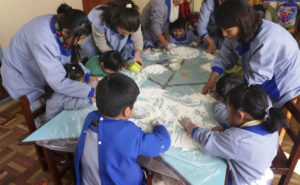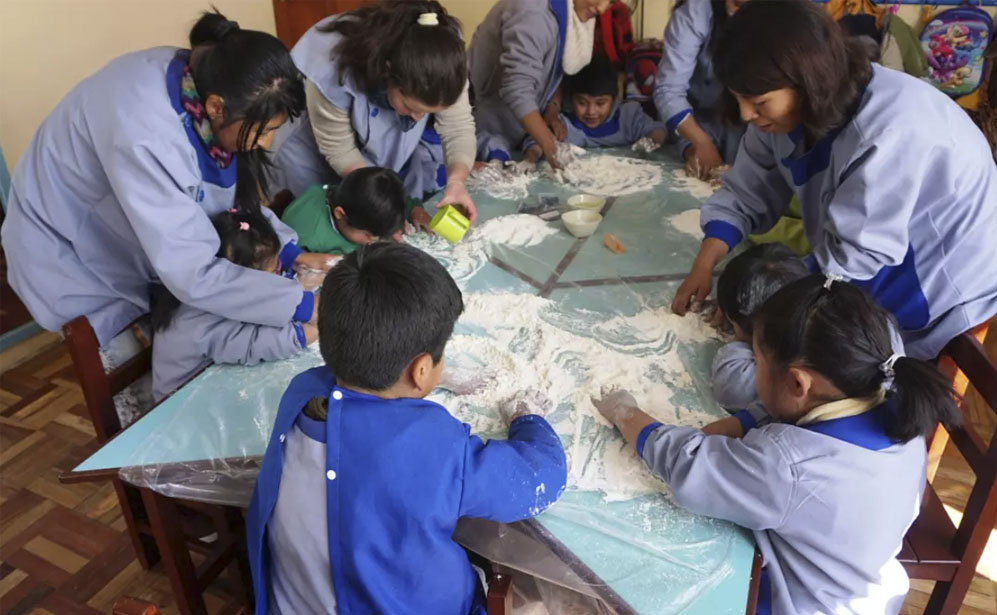 When a family receives the news that their son or daughter has a disability, they initiate a long obstacle course that, for one reason or another, will often last a lifetime. The impact this causes on the family is almost always accompanied by great concern and anguish, which will be increased by the reality that the society where these minors must live does not have adequate means or conditions for their care and development.
When a family receives the news that their son or daughter has a disability, they initiate a long obstacle course that, for one reason or another, will often last a lifetime. The impact this causes on the family is almost always accompanied by great concern and anguish, which will be increased by the reality that the society where these minors must live does not have adequate means or conditions for their care and development.
Since we started working in La Paz, we have witnessed situations involving discrimination against these minors and their parents, due to the stigmatization of disability, which is considered a divine punishment or a curse.
The social rejection is so great that many families hide their sons and daughters out of guilt and shame. This is one of the reasons why 94% of Bolivian minors with disabilities do not attend school regularly, but it is not the only one.
The importance of early childhood care
Although parents manage to face this social rejection, numerous barriers arise before them, such as the lack of specialized children’s centers where these little ones can receive early stimulation, essential to help them enhance all their physical, cognitive, sensory and affective skills.
Families with few resources in La Paz have difficulties in obtaining free places for early childhood education (from 0 to 4 years old). If the minor also has a disability, it is even more complicated. This implies more difficulties for him when it comes to accessing public school, since he will not have had the opportunity to enhance his development and learning capacity.
The invisible discrimination
In Bolivia there are integration policies that, in theory, guarantee a quality education for all children, whatever their condition. But in practice, the reality is very different. When a child with a disability turns five (the age at which compulsory education begins in the Andean country) he should have access to a place in public school. However, most centers deny these children their place, alleging the lack of training of educators and the scarcity of resources to care for them.
If any of these little ones have the immense luck of getting a place in a public school, another obstacle arises: if the minor has not received early stimulation during their first years of life and/or they do not have support within the centre, it is most likely who is unable to integrate and follow the rhythm of his peers, therefore, he will leave sooner or later.
In that hard journey through the desert that so many families live, the Special Education and Rehabilitation classroom that we opened in the Mario Losantos del Campo Children’s Center has been a small oasis. This space offers specialized support to children to facilitate their integration into public school. It has a team of educators and physiotherapists who, since its opening, have already managed to integrate several children into regulated education.
An inequality that leads to poverty
Combating school discrimination against these minors is key, not having access to education means for them the beginning of a loop of inequality that, when they reach adulthood, leads them to poverty or to depend completely on their families.
Unfortunately, the Covid-19 pandemic in Bolivia has interrupted their learning at an extremely important stage, which consequently has resulted in serious disorder for most of them: as they are unable to access digital classes, they have endured stress due to the alteration of their routine and prolonged confinement. Hence, it has had negative effects on their physical and emotional development.
At FMLC we strive to provide children with special needs with support that helps them to overcome the first barriers that stand in their way towards achieving educational equality. Because, without access to education, they are totally unprotected.
Learn more about this project



